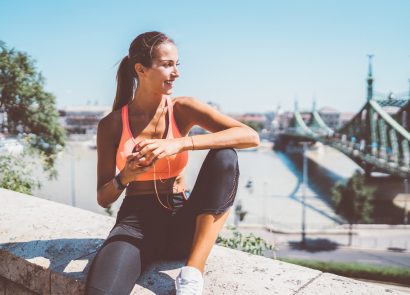The Feel Better in 5 author tells us how just five minutes reconnecting with nature can boost your overall wellbeing
As wonderfully thrilling as cities can be, and for all the fun that can be found in your local town centre, urban life can be draining. But what if you compared how you felt after an hour at the shops to an hour in the countryside? As humans, we intuitively know how to relax in nature. No one feels stressed on the beach, or looking out at a sunset, or walking in a park with your kids. We generally know we feel better when we’re surrounded by greenery or breathing in fresh air.
I believe that nature is the antidote to the modern world; technology, computers, TV – they all force you to look inward, but nature is expansive and I think that’s something that’s really missing from our busy lives.
So what does the research say?
There are many different studies showing the physical, psychological and emotional benefits of being in nature, but one of the most interesting results from the research is to do with something called fractal. Fractals are a geometric shape that you only get in nature – like trees, rivers and mountains. They appear in things such as snowflakes and raindrops, so you’ll never find them in anything man made. What happens to the human mind when looking at a fractal? The levels of the stress hormone, cortisol, go down. The University of Brighton looked at this in more detail and asked what happens if you can’t get out in nature – can just looking at a picture of trees have the same affect? The results? Your stress levels still reduce, but not to the same degree. We as humans are hardwired to thrive in natural environments. That’s why technology companies like Apple and Microsoft always have images of nature as a screensaver option – because it literally reduces our stress levels.
Move more outdoors
Nature is scientifically proven to be a tremendous medicine. We can actually move more exercising al fresco than we can when we’re in the gym. What’s more, our perception of how hard an exercise is, is reduced when we’re in nature. I ask my patients: ‘Can you get a daily dose of nature?’ Even if it’s just five minutes. If you’re able to get out for a walk on your lunch break, you will return to work with your stress levels lowered, but you will also come back more productive. The wonderful thing about nature is that it’s a completely free tool and accessible to many of us.
So, this month, I’m challenging the H&W readers to get just five minutes of nature into your day. Whether that’s sitting in your garden with a cup of tea, staring at the sky or listening to the birds singing – it doesn’t matter – I just ask that you to try it for seven days and see how you feel. You don’t need longer than five minutes – this is enough to make a difference and start feeling better. It’s trying to get the balance between ease and effectiveness and five minutes seems to be the sweet spot for most of us.
For more, read this Feel Better in 5 by Dr Rangan Chatterjee (Penguin Life, £16.99)




















